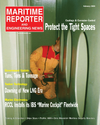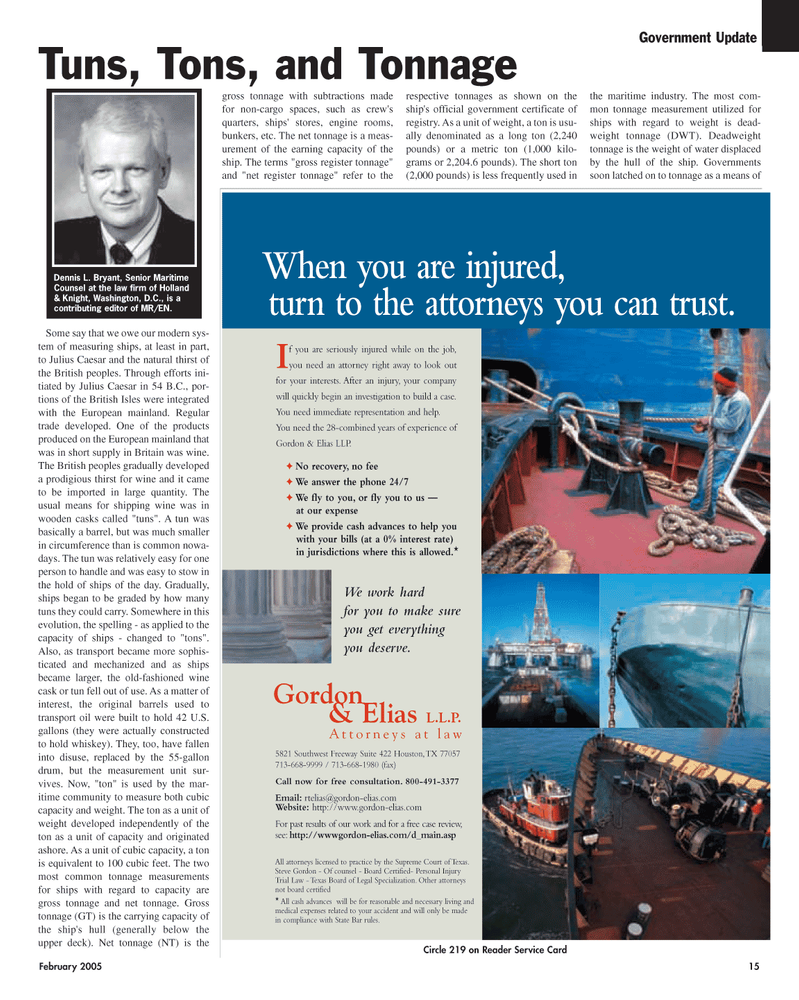
Page 15: of Maritime Reporter Magazine (February 2, 2005)
Read this page in Pdf, Flash or Html5 edition of February 2, 2005 Maritime Reporter Magazine
February 2005 15
Some say that we owe our modern sys- tem of measuring ships, at least in part, to Julius Caesar and the natural thirst of the British peoples. Through efforts ini- tiated by Julius Caesar in 54 B.C., por- tions of the British Isles were integrated with the European mainland. Regular trade developed. One of the products produced on the European mainland that was in short supply in Britain was wine.
The British peoples gradually developed a prodigious thirst for wine and it came to be imported in large quantity. The usual means for shipping wine was in wooden casks called "tuns". A tun was basically a barrel, but was much smaller in circumference than is common nowa- days. The tun was relatively easy for one person to handle and was easy to stow in the hold of ships of the day. Gradually, ships began to be graded by how many tuns they could carry. Somewhere in this evolution, the spelling - as applied to the capacity of ships - changed to "tons".
Also, as transport became more sophis- ticated and mechanized and as ships became larger, the old-fashioned wine cask or tun fell out of use. As a matter of interest, the original barrels used to transport oil were built to hold 42 U.S. gallons (they were actually constructed to hold whiskey). They, too, have fallen into disuse, replaced by the 55-gallon drum, but the measurement unit sur- vives. Now, "ton" is used by the mar- itime community to measure both cubic capacity and weight. The ton as a unit of weight developed independently of the ton as a unit of capacity and originated ashore. As a unit of cubic capacity, a ton is equivalent to 100 cubic feet. The two most common tonnage measurements for ships with regard to capacity are gross tonnage and net tonnage. Gross tonnage (GT) is the carrying capacity of the ship's hull (generally below the upper deck). Net tonnage (NT) is the gross tonnage with subtractions made for non-cargo spaces, such as crew's quarters, ships' stores, engine rooms, bunkers, etc. The net tonnage is a meas- urement of the earning capacity of the ship. The terms "gross register tonnage" and "net register tonnage" refer to the respective tonnages as shown on the ship's official government certificate of registry. As a unit of weight, a ton is usu- ally denominated as a long ton (2,240 pounds) or a metric ton (1,000 kilo- grams or 2,204.6 pounds). The short ton (2,000 pounds) is less frequently used in the maritime industry. The most com- mon tonnage measurement utilized for ships with regard to weight is dead- weight tonnage (DWT). Deadweight tonnage is the weight of water displaced by the hull of the ship. Governments soon latched on to tonnage as a means of
I f you are seriously injured while on the job, you need an attorney right away to look out for your interests. After an injury, your company will quickly begin an investigation to build a case.
You need immediate representation and help.
You need the 28-combined years of experience of
Gordon & Elias LLP. 5821 Southwest Freeway Suite 422 Houston,TX 77057 713-668-9999 / 713-668-1980 (fax)
Call now for free consultation. 800-491-3377
Email: [email protected]
Website: http://www.gordon-elias.com
For past results of our work and for a free case review, see: http://wwwgordon-elias.com/d_main.asp
When you are injured, turn to the attorneys you can trust.
Gordon & Elias L.L.P.
All attorneys licensed to practice by the Supreme Court of Texas.
Steve Gordon - Of counsel - Board Certified- Personal Injury
Trial Law - Texas Board of Legal Specialization. Other attorneys not board certified *
All cash advances will be for reasonable and necessary living and medical expenses related to your accident and will only be made in compliance with State Bar rules. ? No recovery, no fee ? We answer the phone 24/7 ? We fly to you, or fly you to us — at our expense ? We provide cash advances to help you with your bills (at a 0% interest rate) in jurisdictions where this is allowed. *
We work hard for you to make sure you get everything you deserve.
Attorneys at law
Circle 219 on Reader Service Card
Government Update
Dennis L. Bryant, Senior Maritime
Counsel at the law firm of Holland & Knight, Washington, D.C., is a contributing editor of MR/EN.
Tuns, Tons, and Tonnage
MR FEBRUARY 2005 #2 (9-16).qxd 2/2/2005 9:10 AM Page 7

 14
14

 16
16
